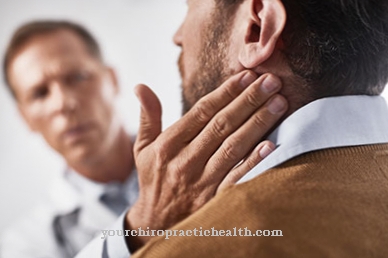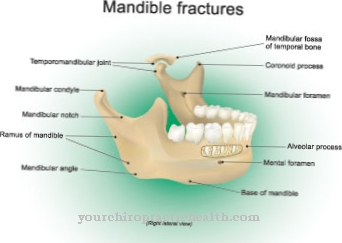Almost everyone has experienced brief dropouts or stumbling of the heart. These so-called Extrasystoles can occur for no apparent reason, but also in stressful situations. While they are usually harmless and quickly disappear, in other cases they can also be the harbinger of serious heart disease. Appropriate treatment of the extrasystoles is essential here.
What are extrasystoles?

Extrasystoles describe a grouping of cardiac arrhythmias, which are also known in medical terminology under the abbreviation ES. They are characterized by so-called extra heartbeats, which are outside the regular heart rhythm. These extra heartbeats come from the ectopic excitation center of the atrium, the HIS bundle, the AV node or the ventricle and therefore not from the so-called sinus node of the heart as is conventionally the case.
As a rule, the normal rhythm of the heart is not influenced by the extrasystoles, as these only occur in the form of interpolated extrasystoles in addition to the regular heartbeat. In certain cases, however, extrasystoles also lead to a pause. This so-called post-extrasystolic pause lasts until the normal heart rhythm resumes.
causes
Extrasystoles occur when a disturbance occurs within the stimulus expansion in the heart. As a result of this disorder, the ventricle and atrium of the heart work against each other for a short time and cause the heart to feel noticeably briefly exposed or tripped. Disturbances from the atrium are referred to as supraventricular extrasystoles, or SVES for short, while disturbances in the ventricle develop as ventricular extrasystoles, or VES for short.
There are a number of possible triggers for both types of extrasystoles. Both positive and negative stressful situations or emotions can cause a heart stumble. Overtiredness also promotes the development of extrasystoles. In other cases, a deficiency in certain minerals such as potassium or magnesium leads to short-term heart failure.
Excessive alcohol or drug consumption and the use of special drugs such as antidepressants can also cause extrasystoles. Caffeine and nicotine represent further possible condition factors. Furthermore, extrasystoles can also occur in the context of health problems, which primarily include thyroid dysfunction or hormonal changes during pregnancy or during menopause.
You can find your medication here
➔ Medicines for cardiac arrhythmiasSymptoms, ailments & signs
Depending on the type of extrasystoles, there are different symptoms in the course of the disease. Supraventricular dropouts of the heart are hardly noticeable for those affected because the atrium still beats evenly towards the ventricle.
In contrast, ventricular extrasystoles show different signs in the person affected, in that the dropouts in the neck or abdomen are perceived in the form of an unpleasant feeling. If the extrasystoles occur particularly frequently, in rare cases they can also trigger dizziness or anxiety in the person concerned.
Complications
As a rule, extrasystoles proceed without complications and therefore do not pose a major health risk. In frequent episodes, however, they represent an indication of the presence of severe cardiac damage. Extrasystoles that occur within the electrical stimulus transmission in the heart are particularly dangerous. They can cause ventricular fibrillation.
If several extrasystoles occur one after the other, these can reflect a precursor to severe cardiac arrhythmias. If the stumbling heart and its causes are not treated, the risk of irreparable heart damage increases dramatically. External causes of the dropouts can lead to a permanent cardiac arrhythmia.
In connection with severe anxiety states, vegetative dystonia, which means a malfunction of the autonomic nervous system, can also develop as a result of heart stumbling.
When should you go to the doctor?
Even if extrasystoles are usually harmless in nature, a visit to the doctor is essential if certain factors are present. If the extrasystoles show up over several minutes or entire hours, for example, those affected should consult a specialist immediately.
Furthermore, medical advice must be obtained in the event of side effects such as shortness of breath, dizziness or impaired consciousness. In these cases, the extrasystoles have often already expanded into cardiac arrhythmias, which in turn can result from serious vascular and heart diseases such as high blood pressure, atrial fibrillation, myocarditis, or heart valve defects.
The cardiologist, who specializes in heart medicine, is the right person to contact if there are any signs of cardiac stumbling. If the extrasystoles are associated with extreme pain and a tremendous feeling of pressure in the chest area, help in the form of an emergency doctor must be urgently sought, as this could be a heart attack.
Doctors & therapists in your area
diagnosis
For the diagnosis of extrasystoles, the electrocardiogram, or ECG for short, is mainly used as part of a medical examination. This instrument makes it possible to differentiate between pathological stumbling of the heart and progressive cardiac arrhythmias. For this purpose, it records the patient's cardiac currents with the help of electrodes, from which point in time, location and extent of the extrasystoles can be determined.
However, if heart stumbling occurs only sporadically, the ECG is usually unsuitable as a diagnostic tool. In this case, 24-hour EKGs can provide more precise information about the individual type of extrasystoles. If the device measures more than 10,000 extrasystoles in a day, the present cardiac stumbling is considered to require treatment. In addition, an exercise ECG enables explicit diagnostic results by consciously provoking cardiac interruptions through exertion.
To do this, the person affected must perform special fitness exercises on a bicycle ergometer or treadmill before their heartbeat and blood pressure are measured. Ultimately, so-called echocardiography is also suitable as a method for the precise determination of extrasystoles. This describes an ultrasound examination of the heart, during which sectional images of the organs and tissues are created. The attending physician can then assess the admission for the presence of certain characteristics.
Treatment & Therapy
The method of treatment for extrasystoles depends on their specific cause. If there is no pathological cause of the heart palpitations, therapy is not absolutely necessary. Often there are only ventricular extrasystoles in the affected person, in which the heart basically works healthily.
If the dropouts still bother the patient, treatment can be used. In this context, the cardiologist usually prescribes low-rationed beta blockers, since the ventricular extrasystoles often occur as a result of stress. If, on the other hand, the stumbling of the heart develops as a result of an illness, the treatment of this again comes to the fore. For this purpose, drugs such as beta blockers are also used, which relieve the heart.
Their mode of action is based on their antihypertensive and stabilizing functionality. The use of certain antiarrhythmics is also conceivable. After a thyroid dysfunction is found to be the causative factor of the heart palpitations, treatment with medication must also be given. In the case of narrowed vessels, a stent is used, which represents an implant for opening vessels and hollow organs. However, not all types of extrasystoles react to this or a drug therapy form, so that the implementation of a so-called catheter ablation is another possible treatment approach.
Research results must have shown in advance that the disturbance of the impulse conduction originates from a special place in the heart. In the course of a catheter ablation, the treating surgeon then places a catheter on the disturbed part of the heart. Then the special place is heated and deserted by a high-frequency current of around 65 degrees. After the procedure, the catheter is removed and the remaining wound is closed with a pressure bandage.
If the diagnosed cause of the extrasystoles carries the risk of sudden cardiac death, a defibrillator is often used, which independently detects dangerous disturbances in the heart rhythm and terminates it with an electric shock.
Outlook & forecast
The prognosis of extrasystoles depends on the nature of their occurrence and the individual treatment. For example, only brief interruptions are given a good prognosis, since the heart's rhythm stabilizes independently here.
The prognosis is more negative if there are frequent extrasystoles that appear several times a day. Because this heart stumbling is a possible precursor of serious cardiac arrhythmias. Atrial fibrillation can arise from the extrasystoles, which, without appropriate treatment, causes irreparable damage to the heart muscle. If frequent heart stumbling is based on a deficiency of certain minerals, the extrasystoles heal quickly and independently as a result of the deficiency symptoms.
The prognosis is worse if there are accompanying symptoms such as dizziness, high blood pressure or impaired consciousness, since external or organic factors can be the cause of the extrasystoles. In this case, a persistent cardiac arrhythmia can develop if treatment for the palpitations and their causes is not treated.
If the dropouts are in turn associated with severe fears, there is a risk of vegetative dystonia, which, without treatment, means an unfavorable prognosis for the extrasystoles.
You can find your medication here
➔ Medicines for cardiac arrhythmiasprevention
Extrasystoles can be caused by a large number of different factors, which can often be prevented in a targeted manner by observing certain principles. A healthy lifestyle is decisive for the absence of extrasystoles. This should primarily be characterized by regular exercise and a balanced diet.
In particular, very fatty and sweet foods should be avoided as far as possible. If you are overweight, it must be reduced urgently in order to get closer to a healthier way of life. In addition, the daily intake must always be adequate. Sufficient sleep and rest phases are also essential for optimal prevention of heart stumbling.
It is also advantageous to avoid or reduce harmful substances such as caffeine, tobacco or alcohol. The use of drugs should be completely avoided. It is also useful to minimize stressful situations in everyday life and at work, which can be promoted by learning special relaxation methods for self-control. This way, future stress factors can be avoided in a targeted manner.
Aftercare
The options of follow-up care prove to be very difficult in the case of extrasystoles and in most cases are not available to the person concerned.The patient must first have this heart complaint treated by a doctor in order to prevent further complications and, in the worst case, death. For this reason, an early diagnosis of the extrasystoles is very important.
In most cases, people with this disease will need to take medication. It is important to ensure that these medicines are taken correctly and regularly in order to avoid further heart problems. If there are unusual feelings in the heart, a doctor must be consulted immediately. In general, a healthy lifestyle with a healthy diet also has a positive effect on the course of this disease.
The person concerned should neither smoke nor drink alcohol. If the extrasystoles are treated by a surgical procedure, it is advisable for those affected to rest after this procedure and take care of their body. Refrain from exertion or other stressful activities. The life expectancy of the person affected may be limited by the extrasystoles.
You can do that yourself
In the case of a harmless cause of the extrasystoles, there are a number of measures with which the heart stumble can be contained independently. So the consumption of harmful substances such as nicotine, alcohol or caffeine should be reduced significantly. The introduction of sufficient sleep and rest phases is also useful to counteract any extrasystoles.
The same applies to relaxation methods such as meditation or autogenic training. It is important to consistently take prescribed medicines for blood pressure, thyroid gland or heart in order to enable them to successfully develop their modes of action in the presence of extrasystoles.
Ultimately, the consumption of special medicinal plants and herbs can also reduce the occurrence of palpitations by balancing out stress. The healing plants include valerian, nettles, lavender, lemon balm, St. John's wort, hops and passion flower. These can be consumed in the form of tea or tablets and not only calm the heart but also the entire circulation of the person concerned.


.jpg)



.jpg)





.jpg)



.jpg)










.jpg)
